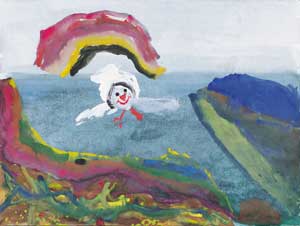|
The Last
Word
|
||
Money, Motherhood, and Really Bad Seascapes
We assume that if the writing were any good, someone would be
paying for it.
 |
|
The Main kids, unlike Mom, have
opted for drawing.
|
When I was at Oberlin in the late 1970s, I always hoped to take part in the kind of radical social action that had made our college famous. Unfortunately, most of the radicals had gone off to graduate school by then. Those of us who'd missed the battles were expected to become part of an occupying force dedicated to preserving the gains of our predecessors. For Obies, this meant devoting ourselves to social work or intellectual or artistic pursuits--any of the higher human endeavors that stand in opposition to middle-class materialism. For minorities and women, it meant that we were to succeed in previously white male careers and make piles of money. This need not be contradictory, so long as you're a middle-class materialist only for the principle of the thing. (I believe you're allowed to keep the money, though; at any rate, everybody has.)
I tried both, and I can report that taking on a previously male career beats financial hell out of intellectual and artistic pursuits. I can't claim to be totally surprised by this, though when I first left law and turned to writing, I did think that brilliance would translate into money. One problem could be the subjective nature of brilliance; I'm not sure even my mother thinks I'm God's gift to literature, and by now I have pretty solid proof that no one else does either. But most art doesn't make money. It costs money. And art that costs money instead of making it is what the IRS calls a hobby.
Americans don't have much respect for hobbies. Art as a hobby puts us in mind of really bad seascapes. Worse, we treat all unpaid artistic endeavors as really bad seascapes, because we assume that someone would be paying for them if they were good. Even those of us in the arts think this way, though we tell each other we don't.
But at least hobby-art gives me something to put on my résumé to prove that I haven't just taken time off these past ten years. "Time off," of course, is the workplace term for "staying home with children." It carries charming connotations of long vacations and sunny afternoons dozing in a hammock, not dirty diapers, lost sleep, and carpools. But when a professional speaks of "time off," she is referring not to idle days but to anything that fails to advance her career. Staying home with kids usually shows up as lost time on a résumé and can be confused with years in drug treatment or the penitentiary if not adequately explained.
Motherhood, if you hadn't noticed, wasn't on the list of career options for Obies. I recall a few students who mentioned that it might figure in their lives in the distant future (like when they were 30), but it was spoken of as an elective, not a major, and one that was admittedly personal and peculiar. Frequently these students offered an apology--"I came from a big family; I can't help it"--as though excusing a large appetite. Even then the rest of us were more perplexed than encouraging. (On the other hand, Obies would have given overwhelming support for fatherhood as a career goal, if anyone had thought of it at the time.)
Motherhood used to command respect automatically, probably even among Obies. But that was when the world needed peopling and when morals were such that having a baby meant being smart enough to have conned someone into marrying you. That kind of respect was of limited value even then; a mother was like a church elder, always treated with deference but left out of the really good parties. It's no surprise that women traded in status for freedom, even at the expense of having to prove our worth individually.
Even as a mom, I wouldn't want it any other way. In my experience, a devout reverence for motherhood is usually accompanied by contempt for women in any other job. So when I meet a guy at a cocktail party who professes respect for my choices, I start sidling away. (Or better yet, I talk about my writing, and he sidles away.) And yet, in spite of having failed miserably in my old Oberlin ideals, I'm pretty happy with my choices.
Yes, a mom with a hobby gets dissed not only by successful artists, but also by other moms (who figure she's neglecting her kids), and by fellow hobbyists (who figure she's neglecting her hobby). But a little success would set all to rights. Meanwhile I've learned to value things I didn't understand in college. Like my children--who have turned out, to my surprise, not to be political or social statements but people similar to the rest of us, only with better hugs.
And I like the thrill of the creative process. Money and recognition would be great, but I've learned that they have nothing to do with art. The satisfaction that comes with creation is complete in itself, whether the product languishes in the study or studio, is made public and earns fame and fortune (or winds up trashed by the critics and remaindered--but that gets you only an entrance ticket to a very large club, not true gratification).
Which is not to say that I've given up on money and recognition. I'm still hoping for that critically acclaimed best seller. Of course, I don't want this for myself, but for women and for Oberlin--that is, for the principle of the thing.
back to Contents page